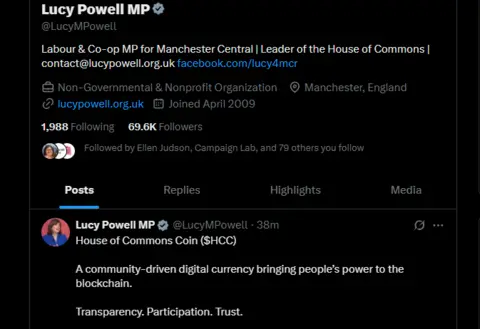Minister's X account hacked to promote crypto scam
 Rex/Shutterstock
Rex/ShutterstockGovernment minister Lucy Powell's X account has been hacked to promote a scam "House of Commons" cryptocurrency.
A string of now deleted posts on the House of Commons leader's account described the "$HCC" coin as "a community-driven digital currency bringing people's power to the blockchain".
The MP's office confirmed her account was hacked on Tuesday morning and said "steps were taken quickly to secure the account and remove misleading posts".
Other public figures with a large number of followers who have been targeted in a similar way by online hackers recently include BBC journalist Nick Robinson.
Some of the posts from Powell's account, which is verified by the platform and mentions her cabinet position in the bio, included an image of the House of Commons logo.
The MP for Manchester Central, who has nearly 70,000 followers on X, has been leader of the House of Commons since Labour won power last summer.
The role is responsible for planning and supervising the government's legislative programme, while also upholding the rights of backbench MPs.
 X
XTaking over X accounts to advertise scam crypto coins is a common method used by cyber criminals.
Fraudsters often take over accounts using phishing emails - scam emails containing links to websites that either access systems or trick users into sharing their passwords.
Passwords can also be obtained using leaked information from data breaches.
At that point cyber criminals take over the account and plan their posts around hastily spun up crypto coins that can only take a couple of hours to create and launch.
They hope that high-profile and trusted accounts might encourage people to buy some of the otherwise worthless coins so that they can make some money before it all get blocked and stopped.
Luke Nolan, a senior research associate at CoinShares, an asset management company specialising in digital assets, said the hack of Powell's account was an example of "pump and dump".
This is when the people who created the cryptocoin inflate its value, get others to invest, and then sell their majority share to get profit, but leave the coin worthless.
Mr Nolan said there had only been 34 transactions on the coin, which would have led to a profit of about £225.
A House of Commons spokesman said: "UK Parliament takes cyber security extremely seriously.
"We provide advice to users - including Members - to make them aware of the risks and how to manage their digital safety; however, we do not comment on specific details of our cyber security policies."
Action Fraud said there was a rise in social and email accounts being hacked in 2024, with 35,343 reports.
It advises setting up 2-step verification for accounts and using a strong, unique password of three random words.
Earlier this year Robinson, who presents BBC Radio 4's Today programme, said his X account was hacked after he clicked on an email he wrongly believed was sent to him by the social media platform.
Post on his account claimed he was launching a cryptocurrency called "$Today".

Sign up for our Politics Essential newsletter to keep up with the inner workings of Westminster and beyond.
